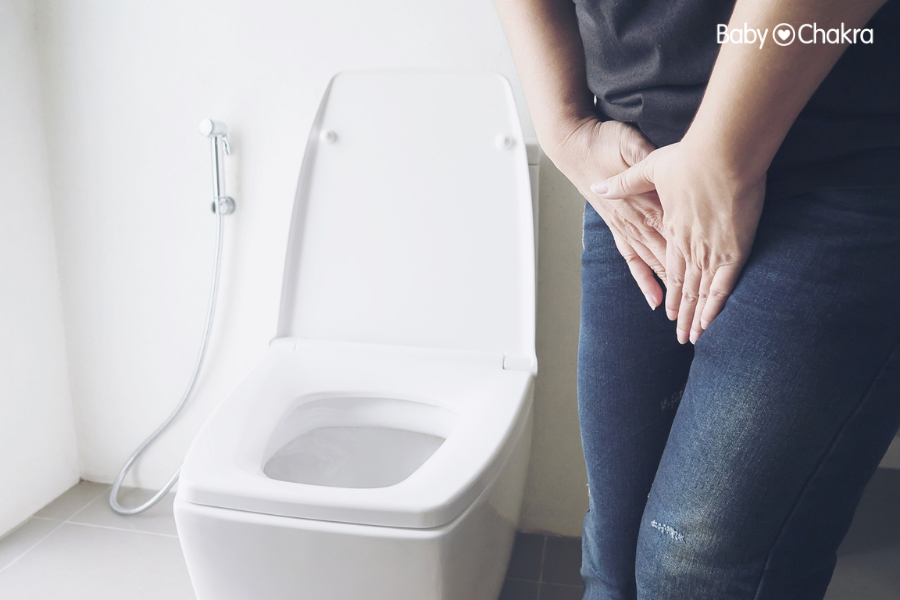
Urine Leakage During Pregnancy: Reasons It Happens And When You Need To Seek Help
30 Jun 2022 | 4 min Read
Reema Shah
Author | 740 Articles
When there is a loss of control over the bladder, it can be referred to as urine leakage or urine incontinence. In simple terms, if your urine tends to leak when coughing, sneezing or if you get a sudden uncontrollable urge to urinate This is a common problem during pregnancy and can be solved with a few methods.
The baby can place a lot of pressure on your bladder during pregnancy and this often leads to urine leakage or incontinence. This problem can happen both during pregnancy and even after childbirth.
What Causes Urine Leakage During Pregnancy?
According to Community Expert Dr. Pooja Marathe, “It’s common during pregnancy or after giving birth. As one’s body changes throughout pregnancy to accommodate a growing baby, the bladder can be placed under pressure. This is normal for many women during pregnancy. Each time one goes to the bathroom, check the colour of the pad in your underwear. A bright orange stain means you have leaked urine. The bright orange will be very obvious. Vaginal discharge often turns yellow as it dries.”

How Does Pregnancy Affect Bladder?
When you’re pregnant, your urine might leak between trips to the bathroom. This is called incontinence. One major type of incontinence that is likely to affect pregnant women is stress incontinence. Pregnant women who experience stress incontinence might leak urine under these circumstances:
- Coughing
- Doing physical activity
- Laughing
A bladder is resting under the uterus but once the growing baby expands, the bladder tends to compress. This makes less space for urine and the extra pressure can make you feel the urge to urinate more often than normal. However, this is temporary and normally goes away within a few weeks of your baby’s birth.
Risks Of Urine Leakage After Pregnancy
The risk of experiencing urine leakage after pregnancy usually depends on the nature of the particular pregnancy, type of delivery, and the number of children one has. Women who have given birth either by C-section or by vaginal delivery are at a much higher risk of stress incontinence than women who have never had a baby.
Sometimes after childbirth, the pelvic organ prolapse can cause the loss of bladder control. This is because the pelvic muscles stretch and become weaker during pregnancy or vaginal delivery. When the pelvic muscles are not able to provide enough support, the bladder might droop or sag. This condition of the bladder to sag is called cystocele and can cause the urethra’s opening to stretch.
Common Reasons for Bladder Control Loss Post Pregnancy
Here are some common reasons why one can cause experience a loss of bladder control after having a baby-
- Injury during delivery: Sometimes, when the delivery involves the use of forceps, it can result in injuries to the pelvic floor muscles along with the anal sphincter muscles.
- Pelvic organ prolapse: When the muscles around the bladder become weak after pregnancy, the pelvic organ might slip out of position leading to a condition called cystocele.
- Pelvic nerve damage: At times, the pelvic nerves that help to control your bladder function can get injured when there’s a difficult or long vaginal delivery.
- Injury caused by prolonged pushing: When there is prolonged pushing during a vaginal delivery, the pelvic nerves are at risk of injury.
Treating Urine Leakage Problems
Here are some ways that help control urine leakage problems-
- Limit the intake of fluids after dinner to reduce the number of bathroom trips during the night.
- Eat fiber-rich foods to avoid constipation as it can also cause urine leakage.
- Avoid carbonated and caffeinated drinks such as coffee and tea as they might increase your urge to urinate. Instead, switch to decaffeinated drinks or plain water.
- Extra body weight gained during pregnancy and childbirth can put additional pressure on the bladder. Lsing weight can provide relief from some of the bladder pressure on your bladder.
- Keep a track of when you experience urine leakage during the day. If you notice a pattern, you can plan your trip to the bathroom ahead of time to avoid urine leakage.
- Do Kegel exercises during the morning, afternoon, and night after consulting with your doctor which can help strengthen your pelvic floor muscles.
When to Visit a Doctor
If you have bladder problems even after six weeks of childbirth, consult with a doctor. Urine leakage can be an indication of an underlying medical condition hence it should be treated on time to avoid any long-term problems.
A


Suggestions offered by doctors on BabyChakra are of advisory nature i.e., for educational and informational purposes only. Content posted on, created for, or compiled by BabyChakra is not intended or designed to replace your doctor's independent judgment about any symptom, condition, or the appropriateness or risks of a procedure or treatment for a given person.
